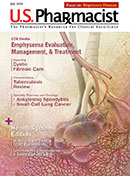Cambridge, UK—With COVID-19 vaccination season approaching, pharmacists have new data to help combat the concern that the shots increase cardiovascular events.
A new study of nearly the entire adult population of England found that the incidence of heart attacks and strokes was lower after COVID-19 vaccination than before or without vaccination. The results were published in Nature Communications.
University of Cambridge researchers and colleagues analyzed deidentified health records from 46 million adults in England between December 8, 2020, and January 23, 2022, comparing the incidence of cardiovascular diseases after vaccination with the incidence before or without vaccination. That constituted the first 2 years of the vaccination program in the UK.
The researchers reported that the incidence of arterial thromboses, such as heart attacks and strokes, was as much as 10% lower in the 13 to 24 weeks after the first dose of a COVID-19 vaccine. Following a second dose, the incidence was as much as 27% lower after receiving the AstraZeneca vaccine and 20% lower after the Pfizer/Biotech vaccine. The researchers noted that the incidence of common venous thrombotic events—mainly pulmonary embolism and lower limb deep venous thrombosis—followed a similar pattern.
“We studied COVID-19 vaccines and cardiovascular disease in nearly 46 million adults in England and found a lower incidence of common cardiovascular diseases, such as heart attacks and strokes, following each vaccination than before or without vaccination,” explains co-first author Samantha Ip, PhD, a research associate at the University of Cambridge. “This research further supports the large body of evidence on the effectiveness of the COVID-19 vaccination program, which has been shown to provide protection against severe COVID-19 and saved millions of lives worldwide.”
For the study, the authors used longitudinal health records to compare the incidence of thrombotic and cardiovascular complications up to 26 weeks after first, second, and booster doses of brands and combinations of COVID-19 vaccines used during the UK vaccination program.
The findings were that:
• The incidence of common arterial thrombotic events (mainly acute myocardial infarction and ischemic stroke) was generally lower after each vaccine dose, brand, and combination
• The incidence of common venous thrombotic events (mainly pulmonary embolism and lower limb deep venous thrombosis) was lower after vaccination
• There was a higher incidence of previously reported rare harms after vaccination: vaccine-induced thrombotic thrombocytopenia after first ChAdOx1 vaccination, and myocarditis and pericarditis after first, second, and transiently after booster mRNA vaccination (BNT-162b2 and mRNA-1273).
“These findings support the wide uptake of future COVID-19 vaccination programs,” the researchers wrote.
The article pointed out that the first dose of COVID-19 vaccines led to an overall reduction in cardiovascular events, and, in rare cases, cardiovascular complications, but added, “There is less information about the effect of second and booster doses on cardiovascular diseases.”
While the findings back up data about rare complications of specific vaccines, no new adverse cardiovascular conditions associated with COVID-19 vaccination were identified, according to the researchers, who suggested that their study offers further reassurance that the benefits of vaccination outweigh the risks.
One issue is that the incidence of cardiovascular disease is higher after COVID-19, especially in severe cases. The study team advised that might explain why the incidence of heart attacks and strokes is lower in vaccinated people compared with unvaccinated people.
“This England-wide study offers patients reassurance of the cardiovascular safety of first, second and booster doses of COVID-19 vaccines,” noted William Whiteley, PhD, MSC, MA, associate director at the British Heart Foundation Data Science Centre and professor of neurology and epidemiology at the University of Edinburgh. “It demonstrates that the benefits of second and booster doses, with fewer common cardiovascular events include heart attacks and strokes after vaccination, outweigh the very rare cardiovascular complications.”
The content contained in this article is for informational purposes only. The content is not intended to be a substitute for professional advice. Reliance on any information provided in this article is solely at your own risk.






